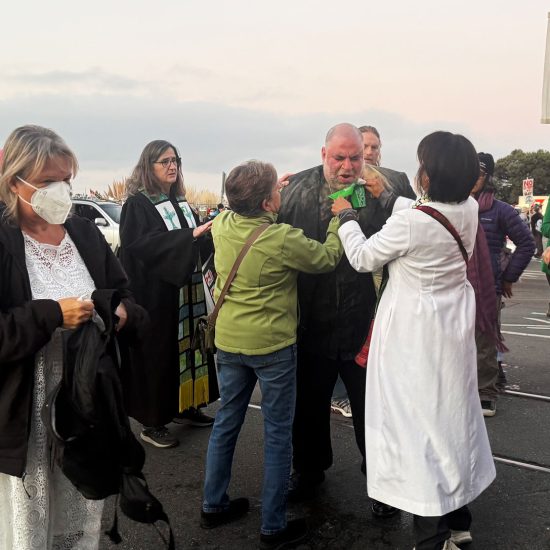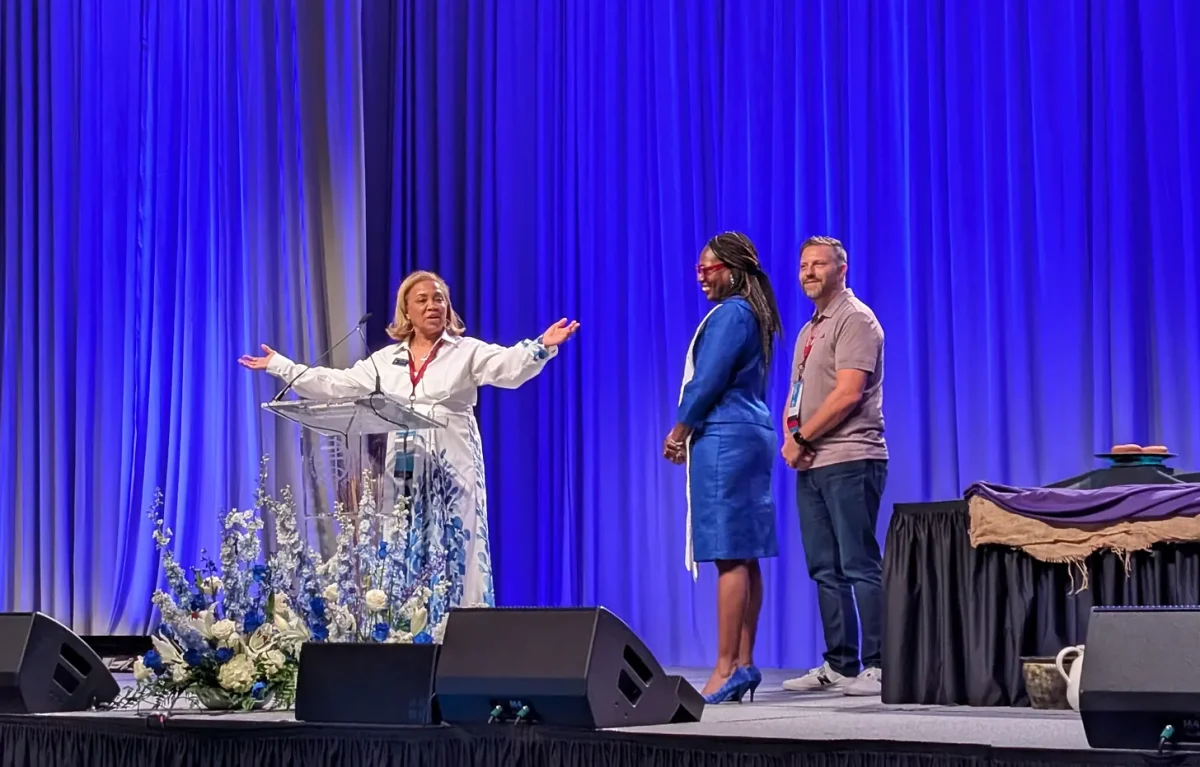
NOTE: This piece was originally published at our Substack newsletter A Public Witness.
A volunteer installing new shelving in a church closet in Massachusetts recently discovered a significant 178-year-old document previously lost for over a hundred years. “A Resolution and Protest Against Slavery” had been signed by 116 Baptist ministers in New England in 1847. The scroll is being called the “Holy Grail” of abolitionist Baptist documents and initially served as a critique against the formation of the Southern Baptist Convention, which had been created to support slavery.
In the document, the group of Baptists in the North noted they must speak against Christians defending slavery as they “witnessed with painful surprise, a growing disposition to justify, extend, and perpetuate their iniquitous system.”
“Under these circumstances we can no longer be silent,” the ministers added in the document. “We owe something to the oppressed as well as to the oppressor, and justice demands the fulfillment of that obligation. Truth and Humanity and Public Virtue have claims upon us which we cannot dishonor.”
While the discovery is important for its historical value, it also provides a witness about a denominational legacy ongoing today for the American Baptist Churches USA, the spiritual and organizational descendants of those abolitionist Baptists.
“It was a unique moment in history when Baptists in Massachusetts stepped up and took a strong position and stood for justice in the shaping of this country,” said Rev. Mary Day Hamel, executive minister of the American Baptist Churches of Massachusetts. “That’s become part of our heritage to this day, to be people who stand for justice, for American Baptists to embrace diversity.”
The discovery of the scroll sparked news headlines across the country as American Baptists were heading to Omaha, Nebraska, for their biennial gathering. But reporters ignored the denominational meeting, apparently viewing this group as merely a historical oddity.
Although the Civil War officially ended the issue of slavery, the differences among Christians as represented by the North-South split among Baptists, Methodists, and Presbyterians in the 19th century haven’t gone away. American and Southern Baptists still read the Bible differently. And that was obvious from the moment Rev. Nikita McCalister, ABCUSA president, gaveled the meeting to a start.
A Black woman ministering in Michigan, McCalister was elected to her term in 2023 during the biennial in Puerto Rico. Although she wouldn’t be accepted among the larger Baptist convention, her presence on the stage wasn’t unusual for American Baptists. The denomination first elected a Black man as president in 1969 and first elected a woman as president in 1921 (which made them the first Protestant denomination in the U.S. with a woman serving as president).
As a sign of the denomination’s commitment to Scripture, McCalister’s signature joined the diverse roster of American Baptist leaders. During the opening session of the biennial, McCalister was invited to sign a Bible gifted to the denomination by the First Baptist Church in Washington, D.C., while that church’s pastor served as the first president after the denomination shifted its name from Northern Baptist to American Baptist in 1950.
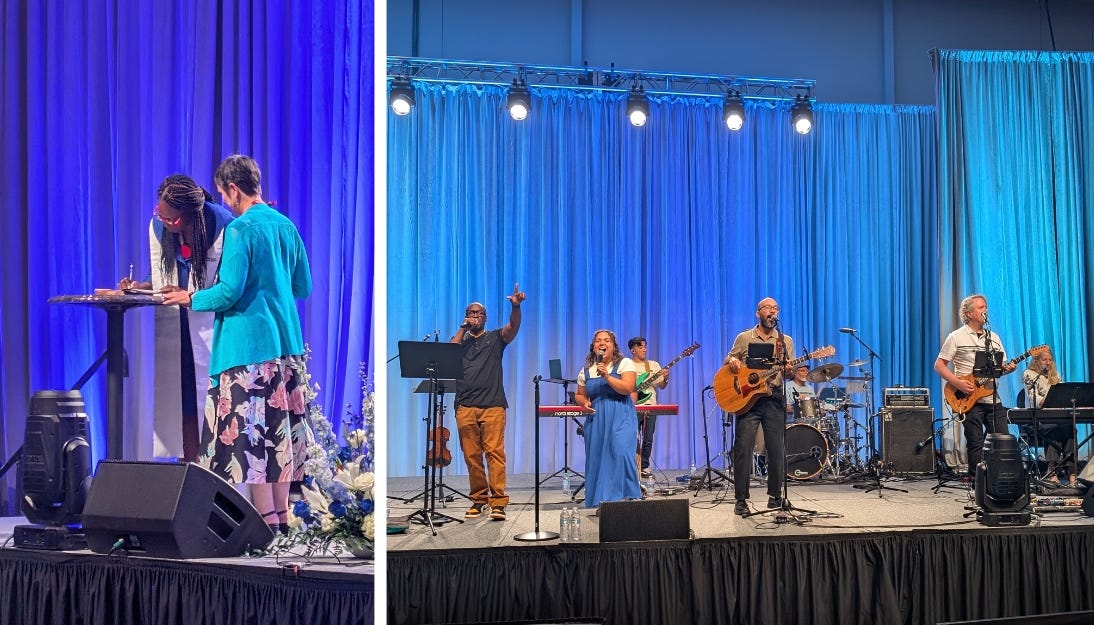
Left: ABCUSA President Nikita McCalister signs a Bible during the ABCUSA biennial mission summit in Omaha, Nebraska, on July 4, 2025. Right: Music during the biennial mission summit on July 4, 2025. (Brian Kaylor/Word&Way)
“The Bible is full of stories of those who cried out to God in times of need. Like Abraham, Sarah, and Hagar,” said Priscilla Eppinger, executive director of the American Baptist Historical Society. “We read stories of God working through leaders like Moses and Miriam, for Kings David and Solomon. The Bible contains words of prophets like Jeremiah and Amos. In this book, we read the names of people who responded to the divine call to establish justice and live out love. Like John the Baptist, Paul, and Peter. Like Dorcas and Lydia.”
“This particular Bible has even more names in it,” added Washam as she held up the gifted Bible before inviting McCalister to sign it. “These names represent faithful Christian leadership across many decades. These are but a few of the names of American Baptist leaders who have dedicated their lives to proclaiming the gospel in word and in deed.”
A short time later, the ABCUSA’s general secretary (or executive director) came on stage to preach. Rev. Gina Jacobs-Strain became the first Black woman in that role when she started last year. Black women holding the two highest offices in the denomination shows that American Baptists still read the Bible differently than Southern Baptists. (Can I hear an “Amen”?)
Yet, even though Southern Baptists are fewer than half of all Baptists in the U.S., you’d never guess that by the news coverage. Unlike the lost scroll, the biennial was occurring out in the open for all to see, but was virtually ignored. So this issue of A Public Witness treks to the Cornhusker State to consider a different way of being Christian today.
‘Generation After Generation’
Greg Mamula, executive minister of American Baptist Churches in Nebraska (which also goes by the name Churches Helping Churches), emphasized the importance of diversity of opinions among Baptists. Such a history, however, also leads to disagreement and divisions.
Recounting the debate over slavery that led to the North-South split, Mamula said it showed that hoping for unity doesn’t mean “avoiding a family quarrel at all costs.” So the leaders of the united Baptist convention “chose a stance on a social issue and a human rights thing” by refusing to endorse enslavers as missionaries, prompting those in the South to secede. The two groups moved in different directions in both how to read the Bible in that context and also in how to structure their denominational bodies.
One such difference between the two groups is that while the SBC crafted a confessional document amid the Modernist-Fundamentalist controversy of the 1920s, those in the North rejected such a proposal. And while the SBC has evolved to treat the document as a binding creed by removing churches for disagreeing on issues like women in ministry, American Baptists have continued to rebuff calls for a denominational confessional statement.
“They were not going to allow a document to determine how they interpreted the Bible,” Mamula explained about the American Baptist perspective. “When we get into these debates and these conversations, we have to ask some really important questions like: Can American Baptists determine for others how they are supposed to interpret Scripture? If so, what does that mean for the concept of the priesthood of the believer and local church autonomy?
All of this means that “while many Baptists share common values,” Mamula said, “every generation has to re-examine what they believe. This is our right; it is our privilege. It’s also the heavy lift we have to do generation after generation, and we do so based on Scripture and context. We will often reaffirm old confessions, old beliefs, orthodox statements. But sometimes we will adjust them, sometimes we will write new ones. And this is when our dialogue with ourselves is at its richest.”
Noting that interpretations of Scripture are impacted by context and experiences, Mamula added that “is why Baptists in Asia are different from Baptists in Africa, why the European Baptists are different than South American Baptists. It is why Baptists in Nebraska in 2025 are different than Baptists in Nebraska in 1857.” He did joke, however, that “Nebraska must be God’s favorite” since it’s “the land where every mountain has been laid low and every valley has been raised up and, judging by the road cones, every rough place is being made smooth.”
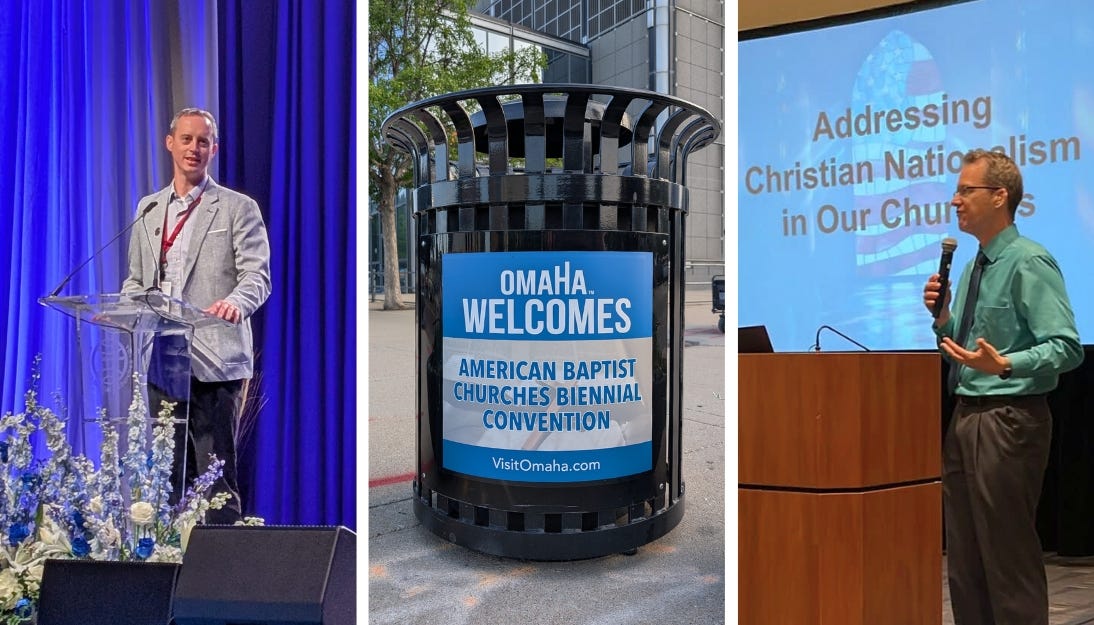
Left: Greg Mamula speaks during the ABCUSA biennial mission summit in Omaha, Nebraska, on July 4, 2025. Center: One of several welcome signs on trash cans in downtown Omaha during the biennial. Right: Brian Kaylor leads a session on Christian Nationalism during the biennial on July 5, 2025. (Word&Way)
Priscilla Eppinger of the American Baptist Historical Society emphasized similar points about what made the denomination unique. She argued that a key way to understand the perspective was to recognize that we cannot force others to believe as we want them to.
“Our response to God’s grace cannot be coerced. You can baptize someone by any means. You can force them to take communion. You can make them go to church, go to Sunday school. You can make them sing in the choir. You could make people do lots of things. What you cannot make anyone do is believe,” she argued. “If a church is a group of believers, that group is voluntary, not coerced. It is by choice.”
Eppinger noted that historically, such an understanding has led Baptists to support “religious freedom for any and all people” since only with such freedom are people “free to choose or reject God’s grace.” This has included demands not just for “freedom to worship as we see fit” but also “the freedom for other people to worship God as they see fit. And that freedom, then, means that the government, the state, doesn’t impose it.” Recalling pushes for such separation of church and state, Eppinger added the denomination is still defined today by advocating for religious freedom for all people, including those who are part of marginalized faiths.
Help sustain the journalism of Word&Way by subscribing to A Public Witness!
Advocating for Oppressed People
Rev. Gina Jacobs-Strain, ABCUSA’s general secretary, preached about the person who had “the longest-recorded conversation with Jesus” in the Bible. Turning to John 4 when Jesus meets the Samaritan woman at the well, Jacobs-Strain noted the person in that conversation was marginalized in her society because of her gender and marital status — leaving her “treated as mere chattel with no rights” — and was further marginalized by the Jewish people because of her ethnicity and faith.
“We’re not given her first name or her last. We don’t know her parents. We don’t know her lineage. We don’t know if she has siblings. In other words, as my grandmother would say, we don’t know her people,” Jacobs-Strain said. “She is identified by her religion, ethnicity, and gender. Too often, she has been limited in commentary, frequently maligned as immoral, while her boldness, curiosity, her theological insights, and her awareness of the coming Messiah have been overlooked. You see, she had an appointment and it was with Jesus. … I want to suggest that from the very beginning she knew more than John gives her credit for.”
Speaking of the religious divide between Jews and Samaritans, Jacobs-Strain pointed out that the “hatred and animosity” included “a disagreement about the proper place to worship God” and incidents where they actually attacked each other’s holy places.
“The conflict wasn’t about whether to worship God, but where to worship God,” she added. “The location mattered more than the act of honoring and worshiping God. And isn’t that a centuries-old issue? Sometimes we fail to keep the main thing the main thing. Worshipping God should have been their primary joy, yet it was a conflict. … Hatred and rivalry is old. And at some point, we should get over it. But the flesh is weak. War never solves anything. It does not bring peace. And hatred does not lead to love.”
Despite the woman having “no social value,” Jesus engaged her, transforming her life. As a result, “the sister once set aside, overlooked, and shunned is essential in transforming the community.”
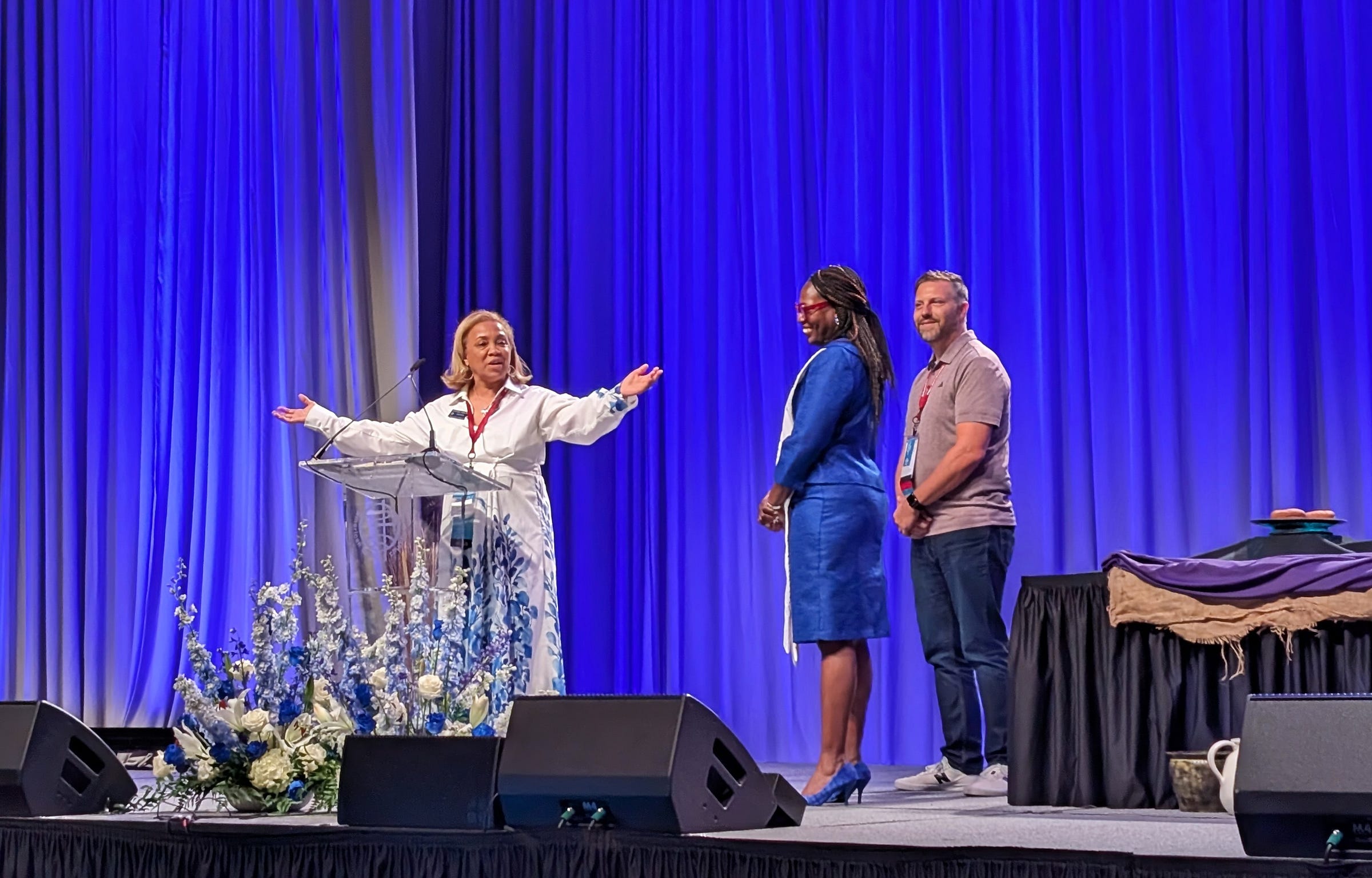
ABCUSA General Secretary Gina Jacobs-Strain (left) welcomes people at the ABCUSA biennial mission summit in Omaha, Nebraska, on July 4, 2025, along with ABCUSA President Nikita McCalister and Biennial Planning Team Chair John Campbell. (Brian Kaylor/Word&Way)
Throughout the biennial, speakers talked about efforts to reach those marginalized in the United States because of their gender, ethnicity, or faith. They spent time acknowledging the Native American peoples who once lived on the land now known as the city of Omaha before being subjected to injustices by the U.S. government. Rev. Edgardo Caraballo, executive minister for American Baptist Churches of Puerto Rico, read John 4 during worship in Spanish to honor those from Puerto Rico and to remember “brothers and sisters from around the world — mainly Latin America — that are suffering right now and are living in fear and are being oppressed here in the United States of America.”
As the biennial started, the board for American Baptist Home Mission Societies issued a public statement denouncing U.S. government efforts to deport “our immigrant neighbors” and to allow immigration raids in houses of worship. They argued the latter “threatens both the spiritual safety of those who gather and the religious liberty that our nation guarantees to all.” And they committed to continuing to “offer pastoral care, accompaniment, and advocacy for immigrants, asylum seekers, refugees, and those facing deportation” in order to “live out our calling to be people of welcome, justice, and fearless love.”
Additionally, in the exhibit hall, the American Baptist Historical Society booth featured an exhibit looking at Japanese American Baptists during World War II, including how they were forced into internment camps and ministered there among their fellow detainees. They started working two years ago to create the historical exhibit, which also has an online version for people to learn more. Now, it seems quite timely as some MAGA supporters buy merchandise and post selfies at signs for “Alligator Alcatraz,” a new detention center for immigrants.
While speaking out against injustices, speakers also noted much of the oppression against marginalized people today is cheered on by Christians, albeit ones who read the Bible differently than those gathered at the biennial in Omaha. As Rev. TaNikka Sheppard, general secretary of the North American Baptist Fellowship, declared, “Right now, many of our nation, many who call themselves Christians are celebrating” polices and systems that hurt “the poor, marginalize vulnerables, and deny resources, killing your friends.” In particular, she called out the “diabolical” efforts to treat people according to “the color of their skin.”
God’s people, Sheppard added, must call out such sins and repent for having “defended racism, justified grief, tolerated xenophobia, protected patriarchy, [and] elevated the antichrist nationalism — all in the name of God.”
As a public witness,
Brian Kaylor

